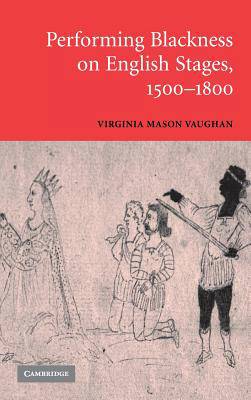
Door een staking bij bpost kan je online bestelling op dit moment iets langer onderweg zijn dan voorzien. Dringend iets nodig? Onze winkels ontvangen jou met open armen!
- Afhalen na 1 uur in een winkel met voorraad
- Gratis thuislevering in België vanaf € 30
- Ruim aanbod met 7 miljoen producten
Door een staking bij bpost kan je online bestelling op dit moment iets langer onderweg zijn dan voorzien. Dringend iets nodig? Onze winkels ontvangen jou met open armen!
- Afhalen na 1 uur in een winkel met voorraad
- Gratis thuislevering in België vanaf € 30
- Ruim aanbod met 7 miljoen producten
Zoeken
€ 172,95
+ 345 punten
Omschrijving
Performing Blackness on English Stages, 1500-1800 examines early modern English actors' impersonations of black Africans. Those blackface performances established dynamic theatrical conventions that were repeated from play to play, plot to plot, congealing over time and contributing to English audiences' construction of racial difference. Vaughan discusses non-canonical plays, grouping of scenes, and characters that highlight the most important conventions - appearance, linguistic tropes, speech patterns, plot situations, the use of asides and soliloquies, and other dramatic techniques - that shaped the ways black characters were 'read' by white English audiences. In plays attended by thousands of English men and women from the sixteenth century to the end of the eighteenth, including Titus Andronicus, Othello and Oroonoko, blackface was a polyphonic signifier that disseminated distorted and contradictory, yet compelling, images of black Africans during the period in which England became increasingly involved in the African slave trade.
Specificaties
Betrokkenen
- Auteur(s):
- Uitgeverij:
Inhoud
- Aantal bladzijden:
- 206
- Taal:
- Engels
Eigenschappen
- Productcode (EAN):
- 9780521845847
- Verschijningsdatum:
- 20/06/2005
- Uitvoering:
- Hardcover
- Formaat:
- Genaaid
- Afmetingen:
- 147 mm x 234 mm
- Gewicht:
- 453 g

Alleen bij Standaard Boekhandel
+ 345 punten op je klantenkaart van Standaard Boekhandel
Beoordelingen
We publiceren alleen reviews die voldoen aan de voorwaarden voor reviews. Bekijk onze voorwaarden voor reviews.











